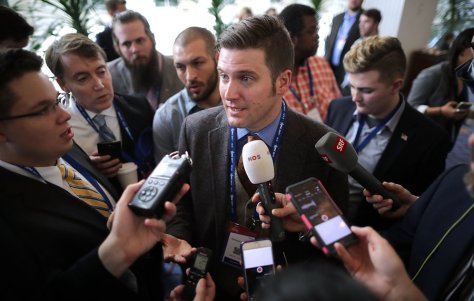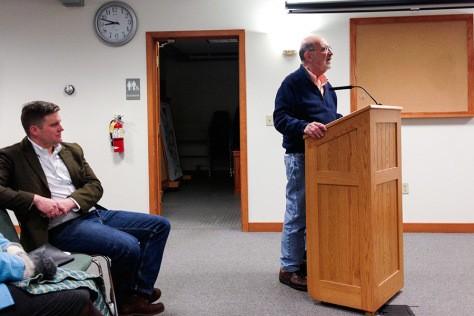Filed under: Analysis, Anti-fascist, Critique, US

Richard Spencer has always fought for a seat at the table. At least the edge of the table.
He entered the broad Conservative Movement in the mid-2000s not through the popular Neoconservative and evangelical hangers-on of the Bush Administration, but through the dissident wing to its right. Brought on as an Assistant Editor at the American Conservative after giving a racially charged speech on the case of Duke Lacrosse players accused of sexually assaulting a black sex worker, Spencer was so out there that even at Pat Buchanan’s home publication, he was the odd man out. Jokingly calling himself as a Nietzsche-con, he was already a subscriber to the “race realist” publication American Renaissance by the time he took the position and he spent his time fraternizing with dissident rightists like Pau Gottfried and Steve Sailer. He then walked through the fringes of the right, from Taki’s Magazine to his flagship AlternativeRight.com, where he set firmly in the camp of “big tent” neo-fascism. While the website published semi-mainstream paleoconservatives at first, it continued to drift in the direction of the French New Right and pseudo-intellectual strains of white nationalism, all while Spencer desperately held on to any connection to the Conservative Movement he claimed to loathe.
As AlternativeRight.com came into its own and Spencer took over the National Policy Institute, he became one of the most toxic figures on the edges of the Conservative Movement. After Jack Hunter’s past as the Southern Avenger was dredged up, the fact that he co-hosted the Taki’s Magazine podcast with Spencer was another blow to his failing career. When the Heritage Foundation published an erroneous report on the multi-trillion dollar cost of immigration in the U.S., one of their analysts, a new conservative careerist named Jason Richwine, was shown to have published a Harvard dissertation that asserted racial differences in intelligence. A quick Google search found that he also had published at AlternativeRight.com for editor Richard Spencer, which provided the last nail in his coffin.
Though a few renegades from mainstream conservatism would still take his calls, the rest of the world was telling him no. Though he fashioned himself as a bohemian intellectual, the rest of the movement disagreed, and instead put him back firmly in the camp of David Duke, William Pierce, and George Lincoln Rockwell. The narrative he created for himself was rejected by the broader world, and his desire for a “dialogue” was met with a firm “No.”
That was, of course, until a series of blogs, trolls, and trending hashtags took Spencer’s brand of pseudo-intellectual white nationalism into the Chan culture of vulgar abbreviations and he was back in the news. The Alternative Right was shortened to #AltRight and used again as a catch-all for angry white men enamored by race realism, anti-democratic philosophy, the reclamation of vulgar patriarchy, and conspiracy laden anti-Semitism. Now media outlets could not get enough of Richard Spencer, and just about every conference appearance, event, or public disagreement was cause for dozens of articles, and his views and ideas were republished on a daily basis. His whole career was now happening at once as his entire history was being condensed into biographical think pieces and antagonistic retreads of right-wing agitprop, all making his own synthesis of the French New Right and American white nationalism seem as though it was new and fresh.
And he was waiting.
Spencer embraced the attention with open arms, ready to give interview after interview, repeating the same answers to different questions. As the interest swelled, and the press finally showed up for his previously vacant press conference, he got cocky. While most people focused on the leaked video from The Atlantic from the National Policy Institute’s 2016 conference featuring attendees Seig Heiling, during the lunch-time press conference he berated the gaggle of reporters that crowded in front of the attendants. Weeks later he came to a heavily-contested appearance at Texas A&M, where he was notably off his game, instead mocking and insulting attendants and refusing to answer questions with the pragmatic sincerity that marked his earlier branding.
Spencer marked this as a point of entry into the culture, that he and his ideas had “arrived.” He called 2016 the “Year of the Alt Right” and jokingly said “We’re the establishment now.” His assent was actually a free fall, one he could not see amidst the glare of the spotlight. While he believed he was mainstreaming his ideas, he instead was becoming a reality star famous for his own eccentricities and a society’s lurid fascination with the trainwrecks of social mood. Spencer’s fame provided him nothing tangible, nothing real.
Now that his antics have been overexposed, the sheen has worn off completely. The world that said “Yes” to him only so briefly has now become a rapid fire series of “Nos,” denying him entry to almost any avenue he has listed. At the recent Students for Liberty conference, a libertarian student organization that skews left on social issues, Spencer arrived at the invitation of a small Alt Right friendly contingent known as the Hoppe Caucus. He wasn’t even allowed in the conference gates before being banned, relegated to the bar, and publicly denounced by Jeffrey Tucker. While the Alt Right made some minor inroads with some chapters of Students for Liberty and, more definitively, with Young Americans for Liberty, that well has dried up.

Spencer later made his regular trek to the Conservative Political Action Conference, one he does almost yearly as he tries to hold onto this connection with Beltway conservatism. While he thought about getting a press pass, he knew the climate had shifted against him, yet he decided to still attend since he saw multiple panelists there speaking about the dangerous entryism of the Alt Right. Upon entering he was swarmed and banned from attending, though he did end up getting to speak with a few reporters before leaving in a hurry. During one of those exchanges he mentioned that “Depeche Mode was the official band of the Alt Right,” based mainly on his own synth-wave nostalgia that he has used to brand the aesthetics of the Alt Right. Depeche Mode quickly issued as statement decrying both Spencer and the Alt Right, rejecting them entirely. Spencer was short on friends.

In December, an even larger rebellion began happening in his family home of Whitefish, Montana. For several years the Spencer family has been battling against anti-fascist organizations like Love Lives Here and the Montana Human Rights Network, both of which want to stop white nationalist organizing from taking place in their backyard. The city passed an anti-hate ordinance that Spencer tried to undermine with his own IRL trolling, but it united the town for the years that followed. After it became apparent that Richard’s mother, Sherry Spencer, had allowed him to use her property as official headquarters for the National Policy Institute, the community turned on her and demanded that she sell her commercial property and leave. The troll army descended at the behest of Richard’s neo-Nazi friend Andrew Anglin, though the community rose up in defense and the Nazis finally retreated back into obscurity.
The battle with Whitefish started in 2014, shortly after he had tried to hold a “Pan-European” conference in Budapest featuring people like American Renaissance’s Jared Taylor, American Freedom Party’s Tomislav Sunic, and Russian Eurasian nationalist Aleksandr Dugin. The entire government of Hungry, including the Prime Minister Viktor Orban, denounced the conference and Spencer was arrested at a pre-event function, deported back to the U.S. and banned from entering the European Union. He was later officially named “persona non grata” in the United Kingdom, further limiting travel to his sacred homeland.

After separating from his wife, Spencer finally decided to move away from Whitefish to Alexandria, Virginia, where he took up residence with New Jersey Institute of Technology lecturer turned Arktos Publishing editor Jason Reza Jorjani, a brotherhood made in Alt Right heaven. The entire community, led by Alexandria’s Christ’s Church marched against Spencer’s move, and they continue to organize, along with the IWW, for him to move out of the loft he is hiding in.
In a recent Alt Right press conference, the National Press Club had to cancel his reservation citing security concerns over the opposition. This had never happened to Richard, but it marked a shift in the culture that promised a lot of cancelations from venues in the future. Even the private high school he attended, St. Mark’s School of Texas, made a move against him as the “class of 1997” raised money for a refugee charity under the banner that there were “united against Richard Spencer.
In the world of global politics, and even small town life, Richard Spencer is being told “No” by an increasingly hostile public. Now that he has announced his “Danger Zone” campus tour, one modeled on Milo’s failed “Dangerous Faggot” tour and inspired by his perceived success at Texas A&M. The only problem is that when the entire student body is revolting against the Alt Right at every public university, the only universities he will even attempt because of their neutrality rules, he has yet to announce any such public event. The only time he appears it will be against the wishes of the constituency in which he will be surrounded, a see of “No” with only a few hobbyists bent on claiming Alt Right credentials there to say “Yes.”
The leaps that the Alt Right have made, while real and substantial, are dwarfed by the shear size of the anti-fascist opposition that has skyrocketed in their wake. While Richard Spencer is more famous than ever, with his message most crystallized and branded, almost no institution is willing to claim him. His entire strategy, from the hair to the suit to the witty racist retorts, were crafted to give him access to the edge of the culture while maintaining his white nationalist politics. This has receded and he is instead falling into a world of his own extremist base, a choir and no one else. He is all in on his radicalism, but he has lost the only advantage he had for years: the corner of conservatism.
Spencer intends to continue these college tours, focusing on groups like Turning Point and Students for Trump locals. While this has been well promoted, it is unlikely he will have more than one or two dates in the next couple of years. Its just too hard, too much fighting, and far little pleasant banter that Spencer excels in. Students will have to publicly announce their support for Spencer if they are to use university facilities to bring him over, and who would want to publicly associate with a figure for whom public attacks are a cause for universal celebration?
The left opposition has focused on moving the ‘neutrals’ to an emphatic “no,” robbing the ability for recruit to happen on the right before it even has the opportunity to open its arms. Spencer’s conservative appearance, his good looks and fashionable hair, is agreeable personality and penchant for light jokes has acted as a mask for the most radical forms of regressive nationalism, and it is that packaging that has stopped some segments of the public from reviling in horror and breaking his access to the culture even further. For organizers this means making the connections between Spencer the icon and Spencer the ideologue, showing the consequences of open fascism and finding allies that are willing to move from apathy to action, from neutral to “no.”
Spencer’s battle to find a small, but effective group of Yes Men is pulling from a shrinking pool, even if they are louder than ever. Their only benefit is the perception of their power, not their actual effectiveness, and that is something that the left needs to make explicit if they are going to stave off any of the growth. The purpose of denying Spencer a platform is that the access to the culture is a chance to organize, not just to speak, and so the cultural shift against him is a question of power and success, not just words. While the Alt Right may have been celebrating their successful launch as a political movement, it is actually the left that should be clinking its glasses as it moves an entire generation off the fence and directly against their message of racial revenge.
![]()





